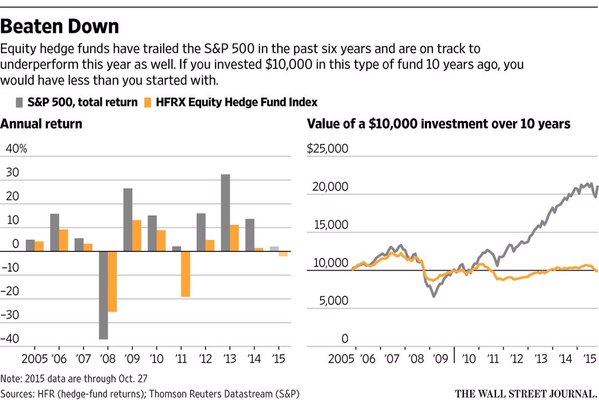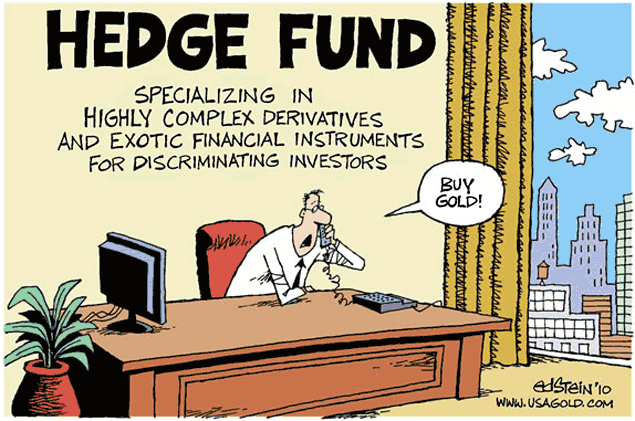Winning the loser's game
Re: Winning the loser's game
...más de la mitad de los fondos de renta variable domiciliados en Polonia (58%) o Suecia (56%) podían considerarse closet trackers al cierre de 2010. Con un 42%, España completa el ‘top 5’ de los países con mayor proporción de gestión pasiva encubierta, por detrás de Finlandia (44%) y Bélgica (43%).
http://www.fundspeople.com/noticias/fon ... ana-224672
- Mensagens: 285
- Registado: 1/7/2014 14:53
Re: Winning the loser's game
ZeNovato Escreveu:É um bocadinho contra o que se tem defendido aqui desde o inicio.
Obviamente que são opiniões e todos temos direito a elas.
Já me tinha lembrado de ir aos índices e ver quais as empresas no top 5 ou top 10 e investir nelas. Por exemplo para "replicar" o SP500 escolher wells fargo, BRKB, exxon, etc.
Mas mesmo assim, para pessoas como eu que não compreendem nada de acções os etf serão melhores, mesmo tendo retornos provavelmente menores que acçoes individuais.....
Coloco muitas referências neste tópico que são contrárias à estratégia que aqui se defende, não sou sectário. Ainda assim, se não ficou perceptível, a minha opinião sobre o artigo citado é a seguinte: O mesmo é um completo disparate.
Remember the Golden Rule: Those who have the gold make the rules.
***
"A soberania e o respeito de Portugal impõem que neste lugar se erga um Forte, e isso é obra e serviço dos homens de El-Rei nosso senhor e, como tal, por mais duro, por mais difícil e por mais trabalhoso que isso dê, (...) é serviço de Portugal. E tem que se cumprir."
***
"A soberania e o respeito de Portugal impõem que neste lugar se erga um Forte, e isso é obra e serviço dos homens de El-Rei nosso senhor e, como tal, por mais duro, por mais difícil e por mais trabalhoso que isso dê, (...) é serviço de Portugal. E tem que se cumprir."
Re: Winning the loser's game
LTCM Escreveu:O investimento na Europa através de um índice revelou-se um mau investimento nos últimos 20 anos e não vejo qualquer razão para que este padrão se altere com a conjuntura económica que se prevê para os próximos anos. No entanto, os índices que representam uma maior percentagem de exportadores para países com elevadas taxas de crescimento, em particular a China, tiveram um retorno bem simpático e superior ao investimento no mercado americano que tomo como referencia. Claro que assim sendo os investidores que preferem os índices poderão optar por seleccionar os melhores mercados da Europa em substituição de um índice global. A mim parece-me mais sensato escolher em cada um destes países as empresas exportadoras com maior capacidade de gerar valor. Dou alguns exemplos: não me atrai nada o investimento no índice francês mas gostaria de estar exposto a algumas empresas que têm encontrado capacidade de crescimento, como a LVMH, que tem marcas como a Moet & Chandon, a Louis Vuitton, a Dior e a Tag Heuer, ou como a Pernod Ricard, ou ainda como a Rémy Cointreau. Em Itália, mesmo sem a eventual e potencial instabilidade política, não gostava de investir no índice mas empresas como a Salvatore Ferragamo, a Luxottica e a Tod's parecem-me boas alternativas de investimento. No caso alemão já me choca menos o investimento através de um índice mas mesmo assim preferia o investimento directo em empresas, nomeadamente nos construtores de automóveis de luxo como a BMW, a Porsche ou a Audi.
Evidentemente que as boas empresas europeias de produtos de luxo, que usei genericamente como exemplos, poderão não ter a mesma valorização nos próximos vinte anos que tiveram no passado. O envelhecimento da população, mais uma vez o factor demográfico, até sugere que não venham a ter mas isso não implica que o investimento directo em acções não continue a ser uma alternativa melhor em relação aos fundos de investimento e aos índices.
Termino sugerindo três estratégias de investimento: a primeira para investidores que se sintam confortáveis com o risco das acções mas que não pretendam mais que isso, uma segunda para quem partilha a minha opinião neste texto e não se incomode com um risco elevado nos seus investimentos e uma terceira, também para quem não se incomode com o risco mas que ache que eu só disse disparates:
1) Analisem e seleccionem 10 a 15 empresas que considerem com maior capacidade de crescimento. É natural que estas empresas já tenham tido bons resultados nos últimos 3 a 5 anos, o que facilita a escolha.
2) Façam a mesma selecção do primeiro grupo e criem uma estratégia alavancada em que ficam longos nestas acções e curtos no índice global. Se não souberem o que é longo, curto ou alavancado, juntem-se ao primeiro grupo.
3) Façam o inverso do segundo grupo, se o índice global se comportar melhor que as acções ganharão dinheiro. Mas não durma descansado e monitorize o seu resultado pelo menos uma vez por semana. O meu conselho, mesmo sabendo que a sua opinião é que eu só disse disparates, é limitar as perdas da sua carteira.
É um bocadinho contra o que se tem defendido aqui desde o inicio.
Obviamente que são opiniões e todos temos direito a elas.
Já me tinha lembrado de ir aos índices e ver quais as empresas no top 5 ou top 10 e investir nelas. Por exemplo para "replicar" o SP500 escolher wells fargo, BRKB, exxon, etc.
Mas mesmo assim, para pessoas como eu que não compreendem nada de acções os etf serão melhores, mesmo tendo retornos provavelmente menores que acçoes individuais.....
- Mensagens: 289
- Registado: 8/3/2014 19:34
Re: Winning the loser's game
O investimento na Europa através de um índice revelou-se um mau investimento nos últimos 20 anos e não vejo qualquer razão para que este padrão se altere com a conjuntura económica que se prevê para os próximos anos. No entanto, os índices que representam uma maior percentagem de exportadores para países com elevadas taxas de crescimento, em particular a China, tiveram um retorno bem simpático e superior ao investimento no mercado americano que tomo como referencia. Claro que assim sendo os investidores que preferem os índices poderão optar por seleccionar os melhores mercados da Europa em substituição de um índice global. A mim parece-me mais sensato escolher em cada um destes países as empresas exportadoras com maior capacidade de gerar valor. Dou alguns exemplos: não me atrai nada o investimento no índice francês mas gostaria de estar exposto a algumas empresas que têm encontrado capacidade de crescimento, como a LVMH, que tem marcas como a Moet & Chandon, a Louis Vuitton, a Dior e a Tag Heuer, ou como a Pernod Ricard, ou ainda como a Rémy Cointreau. Em Itália, mesmo sem a eventual e potencial instabilidade política, não gostava de investir no índice mas empresas como a Salvatore Ferragamo, a Luxottica e a Tod's parecem-me boas alternativas de investimento. No caso alemão já me choca menos o investimento através de um índice mas mesmo assim preferia o investimento directo em empresas, nomeadamente nos construtores de automóveis de luxo como a BMW, a Porsche ou a Audi.
Evidentemente que as boas empresas europeias de produtos de luxo, que usei genericamente como exemplos, poderão não ter a mesma valorização nos próximos vinte anos que tiveram no passado. O envelhecimento da população, mais uma vez o factor demográfico, até sugere que não venham a ter mas isso não implica que o investimento directo em acções não continue a ser uma alternativa melhor em relação aos fundos de investimento e aos índices.
Termino sugerindo três estratégias de investimento: a primeira para investidores que se sintam confortáveis com o risco das acções mas que não pretendam mais que isso, uma segunda para quem partilha a minha opinião neste texto e não se incomode com um risco elevado nos seus investimentos e uma terceira, também para quem não se incomode com o risco mas que ache que eu só disse disparates:
1) Analisem e seleccionem 10 a 15 empresas que considerem com maior capacidade de crescimento. É natural que estas empresas já tenham tido bons resultados nos últimos 3 a 5 anos, o que facilita a escolha.
2) Façam a mesma selecção do primeiro grupo e criem uma estratégia alavancada em que ficam longos nestas acções e curtos no índice global. Se não souberem o que é longo, curto ou alavancado, juntem-se ao primeiro grupo.
3) Façam o inverso do segundo grupo, se o índice global se comportar melhor que as acções ganharão dinheiro. Mas não durma descansado e monitorize o seu resultado pelo menos uma vez por semana. O meu conselho, mesmo sabendo que a sua opinião é que eu só disse disparates, é limitar as perdas da sua carteira.
Remember the Golden Rule: Those who have the gold make the rules.
***
"A soberania e o respeito de Portugal impõem que neste lugar se erga um Forte, e isso é obra e serviço dos homens de El-Rei nosso senhor e, como tal, por mais duro, por mais difícil e por mais trabalhoso que isso dê, (...) é serviço de Portugal. E tem que se cumprir."
***
"A soberania e o respeito de Portugal impõem que neste lugar se erga um Forte, e isso é obra e serviço dos homens de El-Rei nosso senhor e, como tal, por mais duro, por mais difícil e por mais trabalhoso que isso dê, (...) é serviço de Portugal. E tem que se cumprir."
Re: Winning the loser's game
Do-it-yourself (DIY) investors who prefer to buy active funds, run by City stock pickers, face the same long odds, new analysis by Morningstar for Telegraph Money has found.
The data firm analysed the 1396 funds that have a ten year track record. It applied a simple filter to identify funds that managed to produce consistent performance across different cycles of the market.
To make the grade and be deemed a consistently good performer the fund had to have been among the top 10pc performers in their respective sectors over one, three, five and 10 years.
A total of 19 out of the 1396 achieved the feat, equating to 1.4pc in percentage terms.
When the one year figure was stripped out the number of funds that were successful rose to 36.
The long odds highlight that do-it-yourself investors have a slim chance of picking a fund manager that adds value over both the short and long term.
Similar conclusions have also been made by a number of respected academic papers over the years, including the Pensions Institute at Cass Business School.
In June 2013 the body issued a damning study into active funds. It found that 99pc failed to beat the stock market between 1998 and 2008, returning an average of 1.4 percentage points less than the market each year.
Remember the Golden Rule: Those who have the gold make the rules.
***
"A soberania e o respeito de Portugal impõem que neste lugar se erga um Forte, e isso é obra e serviço dos homens de El-Rei nosso senhor e, como tal, por mais duro, por mais difícil e por mais trabalhoso que isso dê, (...) é serviço de Portugal. E tem que se cumprir."
***
"A soberania e o respeito de Portugal impõem que neste lugar se erga um Forte, e isso é obra e serviço dos homens de El-Rei nosso senhor e, como tal, por mais duro, por mais difícil e por mais trabalhoso que isso dê, (...) é serviço de Portugal. E tem que se cumprir."
Re: Winning the loser's game
We report strong evidence that changes of momentum, i.e. "acceleration", defined as the first difference of successive returns, provide better performance and higher explanatory power than momentum. The corresponding Γ-factor explains the momentum-sorted portfolios entirely but not the reverse. Thus, momentum can be considered an imperfect proxy for acceleration, and its success can be attributed to its correlation to the predominant Γ-factor. Γ-strategies based on the "acceleration" effect are on average profitable and beat momentum-based strategies in two out of three cases, for a large panel of parameterizations. The "acceleration" effect and the Γ-factor profit from transient non-sustainable accelerating (upward or downward) log-prices associated with positive feedback mechanisms
Remember the Golden Rule: Those who have the gold make the rules.
***
"A soberania e o respeito de Portugal impõem que neste lugar se erga um Forte, e isso é obra e serviço dos homens de El-Rei nosso senhor e, como tal, por mais duro, por mais difícil e por mais trabalhoso que isso dê, (...) é serviço de Portugal. E tem que se cumprir."
***
"A soberania e o respeito de Portugal impõem que neste lugar se erga um Forte, e isso é obra e serviço dos homens de El-Rei nosso senhor e, como tal, por mais duro, por mais difícil e por mais trabalhoso que isso dê, (...) é serviço de Portugal. E tem que se cumprir."
Re: Winning the loser's game
The procyclical or trend-chasing allocation accentuates the underlying economic shocks to various investment styles as flows push valuations. In the short run, this results in self-fulfilling prophecy and momentum. In the long run, it becomes self-defeating and gives rise to mean reversion. This investor pattern contributes to a predictive relationship between the valuation multiple and future return. Frazzini and Lamont (2008) and Hsu, Myers, and Whitby (2015) find evidence that mutual fund flows predict negative future fund performance. Figure 3 shows that mutual funds with high inflows have low next-period relative performance. Figure 4 shows that the investor return gap, which is driven by the negative correlation between flows and subsequent returns, is large across all fund categories. This pattern is observed for pensions as well, although to a smaller degree.


Remember the Golden Rule: Those who have the gold make the rules.
***
"A soberania e o respeito de Portugal impõem que neste lugar se erga um Forte, e isso é obra e serviço dos homens de El-Rei nosso senhor e, como tal, por mais duro, por mais difícil e por mais trabalhoso que isso dê, (...) é serviço de Portugal. E tem que se cumprir."
***
"A soberania e o respeito de Portugal impõem que neste lugar se erga um Forte, e isso é obra e serviço dos homens de El-Rei nosso senhor e, como tal, por mais duro, por mais difícil e por mais trabalhoso que isso dê, (...) é serviço de Portugal. E tem que se cumprir."
Re: Winning the loser's game
David Harding, Winton's founder, is by some estimates the UK's single largest individual taxpayer and almost certainly the UK's highest paid,...,
He does have a beef, however, with his company simply being referred to as a CTA, or a commodity trading adviser – hedge funds that tend to follow trends in markets using computers to place bets.
“We are not a f***ing CTA,” he quips. “We are a company that has a specialism in CTA programmes. Actually, no, what we are is an investment manager that uses quantitative mathematical methods. Actually, scratch that: we are an investment management company with a successful track record of investing money over very many years, thank you very much.”
And it is a strategy that has proved largely successful. CTAs were a rare strong performer during the worst years of the financial crisis and assets under management at Winton took off after the company generated a 21 per cent return for clients in 2008. That year the average hedge fund lost 19 per cent. Winton now manages $25.5bn of assets after starting life with less than $2m.
http://www.ft.com/cms/s/0/ca73ff3a-e7e7 ... z3sWTozxBc
Remember the Golden Rule: Those who have the gold make the rules.
***
"A soberania e o respeito de Portugal impõem que neste lugar se erga um Forte, e isso é obra e serviço dos homens de El-Rei nosso senhor e, como tal, por mais duro, por mais difícil e por mais trabalhoso que isso dê, (...) é serviço de Portugal. E tem que se cumprir."
***
"A soberania e o respeito de Portugal impõem que neste lugar se erga um Forte, e isso é obra e serviço dos homens de El-Rei nosso senhor e, como tal, por mais duro, por mais difícil e por mais trabalhoso que isso dê, (...) é serviço de Portugal. E tem que se cumprir."
Re: Winning the loser's game
You can all relax and unpack those boxes and family photos. Your jobs are safe. Although none of you said it explicitly, I know how worrying the arrival of a disruptive new talent can be. But fear not. My foray into liability-driving investments affirmed to me that you are all magicians, I will not ever be able to retire, and should probably figure out how the damn yield curve works. For the sake of my 50% (real-life money) allocation to JP Morgan SmartRetirement 2050, please, please don’t leave us normals alone to single-handedly fund our highly idiosyncratic, tail-risk fraught, longevity-unhedgeable 0-to-40-year-duration retirement liabilities.
I tried. This is my second-best portfolio with $1,000 in Kip Coins:
● 75% global developed-market equities, passively invested in a broad and low-cost index fund.
● 15% nominal bonds, the longest duration I can get my hands on.
● 10% inflation-linked long-duration bonds, to begin “laying bricks” for the low-cost, high-value annuity product David and Co. will invent between now and then.
But Frank van Etten, you were right all along. I don’t want a well-funded 401(k) to secure my retirement. I want a defined benefit pension.
Thus, my final portfolio: 100% to first-year tuition at a teachers’ college. By 2018, the fine citizens of Canada will be funding my retirement liabilities, in full, by law, and as far down that longevity tail as I can ride it.
To cap off my foray as CIO of an LDI-oriented imaginary family office, I diversified my bad-judgment risk and shared the strategy with van Etten.
Verdict: “……. Well. It probably works.”
http://www.ai-cio.com/channel/NEWSMAKER ... Money/?p=2
fj201 Escreveu:http://eu.spindices.com/resource-center/thought-leadership/research/
2014 Fundos Activos de gestores profissionais altamente bem pagos esmagados pelo SP500: 86,44% (Oitenta e seis vírgula Quarenta e Quatro por Cento)
2008 (BEAR MARKET) Fundos activos atropelados pelo SP500: 54,34%
Fundos Activos Mid Cap foram cilindrados pelo etf do SP MidCap 400: 74,74% Esmagados;
Fundos Activos Small Cap foram cilindrados pelo etf do SP Small Cap 600: 83,77% Esmagados;
- Mensagens: 305
- Registado: 28/7/2015 9:59
Re: Winning the loser's game
My Dangerously Selective Memory
By James Osborne, CFP® | Published: November 18, 2015
http://www.basonasset.com/my-dangerousl ... ve-memory/
By James Osborne, CFP® | Published: November 18, 2015
(...)
Your homework today is to spend some time forcing yourself to remember being scared about the markets. Force yourself to relive the anxiety and worry of being down 5% and wondering if 20% is coming next. Remember what it was like to worry that war might break out or disease was spreading or economic collapse was around the corner. Not because this alone is a good practice, but because it is going to happen again, and sooner than you think. It happens every year like clockwork. You can’t pick a time in history that something scary wasn’t around the corner. You need to hold on to those past moment and then recognize that even though it was truly scary life moved on and markets recovered and the world didn’t, in fact, come to an end. So that when next time the fear comes, you think “this is scary and unpleasant and a little awful, and it was last time too!” Then you can remember that the fear this time only feels different. It isn’t truly different.
http://www.basonasset.com/my-dangerousl ... ve-memory/
fj201 Escreveu:http://eu.spindices.com/resource-center/thought-leadership/research/
2014 Fundos Activos de gestores profissionais altamente bem pagos esmagados pelo SP500: 86,44% (Oitenta e seis vírgula Quarenta e Quatro por Cento)
2008 (BEAR MARKET) Fundos activos atropelados pelo SP500: 54,34%
Fundos Activos Mid Cap foram cilindrados pelo etf do SP MidCap 400: 74,74% Esmagados;
Fundos Activos Small Cap foram cilindrados pelo etf do SP Small Cap 600: 83,77% Esmagados;
- Mensagens: 305
- Registado: 28/7/2015 9:59
Re: Winning the loser's game
pata-hari Escreveu:LTCM, de onde veio este artigo? não consegui perceber o que definem como contrarian em termos exactos e estou com esperança de perceber melhor a que se referem exactamente. Qual é critério de avaliação? sentimento? medido como?
http://www.institutionalinvestor.com/Ar ... k0Ear94MQ0
Remember the Golden Rule: Those who have the gold make the rules.
***
"A soberania e o respeito de Portugal impõem que neste lugar se erga um Forte, e isso é obra e serviço dos homens de El-Rei nosso senhor e, como tal, por mais duro, por mais difícil e por mais trabalhoso que isso dê, (...) é serviço de Portugal. E tem que se cumprir."
***
"A soberania e o respeito de Portugal impõem que neste lugar se erga um Forte, e isso é obra e serviço dos homens de El-Rei nosso senhor e, como tal, por mais duro, por mais difícil e por mais trabalhoso que isso dê, (...) é serviço de Portugal. E tem que se cumprir."
Re: Winning the loser's game
LTCM, de onde veio este artigo? não consegui perceber o que definem como contrarian em termos exactos e estou com esperança de perceber melhor a que se referem exactamente. Qual é critério de avaliação? sentimento? medido como?
Re: Winning the loser's game
ricardmag Escreveu:A pergunta deve ser estúpida mas para um leigo na matéria como eu pode até nem ser ...

O que é contrarien timing? Obrigado
Cumprimentos
Value (or contrarian) investing and momentum (or trend) investing have long been core to what we do and, we believe, are the strongest empirical regularities in finance.
Market timing has long been regarded by many as an investing sin. We find that, consistent with the gigantic amount of evidence across a diverse set of markets and asset classes, value and momentum have something to add in timing, too. But, consistent with the intuition of many, we still find that market timing of one or two asset classes is very hard.
Thus, our advice is to “sin a little” (perhaps very little) but not to be completely chaste.
Remember the Golden Rule: Those who have the gold make the rules.
***
"A soberania e o respeito de Portugal impõem que neste lugar se erga um Forte, e isso é obra e serviço dos homens de El-Rei nosso senhor e, como tal, por mais duro, por mais difícil e por mais trabalhoso que isso dê, (...) é serviço de Portugal. E tem que se cumprir."
***
"A soberania e o respeito de Portugal impõem que neste lugar se erga um Forte, e isso é obra e serviço dos homens de El-Rei nosso senhor e, como tal, por mais duro, por mais difícil e por mais trabalhoso que isso dê, (...) é serviço de Portugal. E tem que se cumprir."
Re: Winning the loser's game
A pergunta deve ser estúpida mas para um leigo na matéria como eu pode até nem ser ... 

O que é contrarien timing? Obrigado
Cumprimentos
O que é contrarien timing? Obrigado
Cumprimentos
"Quando a música acaba, apagam-se as luzes." The Door's
Re: Winning the loser's game
LTCM Escreveu:Let’s sum up the practical takeaways for disciplined market timing:
Combine signals. The long-term track record of trend following is better than contrarian CAPE trading (and similarly, trend following is better than contrarian real bond yield timing in bonds). But this is not the only evidence we have. Across investing, contrarian and trend strategies tend to pay off and diversify each other and seem to work best as equal partners. We certainly do not recommend looking at each area of investing separately and choosing which worked better in a backtest. For instance, in the world of stock picking (trying to outperform a given index not through timing but through fully invested stock selection), there is the famous exception of Japan, where value investing has utterly dominated momentum investing (the opposite of the result we found here for timing). This has occurred, yet we definitely do not recommend doing only contrarian or value within Japan versus zero momentum or trend. We think that would be way too large a concession to data mining. In the case of timing, one could make an argument that trend following is more robust. A trend is a trend; it’s easy to define, whereas valuation measures may have long drifts, perhaps for some valid reasons, making them more difficult to compare through time. In a cross-sectional (for example, stock-picking) model, perhaps much of that drift is irrelevant, as it’s present on both sides of the ledger. Thus, if pressed, we could come up with reasons to lean more toward trend than contrarian for timing and wouldn’t oppose others who might choose to do this. But for us the gains, even in backtests, of overweighting trend signals versus contrarian ones are small, and the discipline of not always coming up with a story to fit what’s worked better dominates.
Include at least stock and bond timing. Breadth is good when you have real but low-return-for-risk signals (actually, breadth is always good but especially important in this case). Comprehensive breadth means using contrarian and trend (along with other tested styles, like leaning toward low risk, high quality and high carry when applicable) in as many places as possible. In the narrower context of market timing, which is what we study here, we find even the limited breadth of timing two asset classes instead of one is important.
Have modest expectations. Market timing is not a sin, particularly if based on the same principles — value and momentum — ubiquitous in modern investing. However, it is also not a high-return-for-risk strategy. This fits intuition. In our view anyone claiming to have very high-return-for-risk timing systems should be taken with a grain of salt. We believe the proper thing to do with low-return-for-risk strategies is not to ignore or eschew them. The proper thing is to do them, but only in very moderate amounts. Portfolio theory doesn’t tell us to only do the very best things but to do everything that can add value proportional to how good it is (considering things like correlations and other factors). We are serious when we say, “If you sin, then sin only a little.” Also, as part of having modest expectations, be willing to accept the gains to value- and trend-based market timing either through higher returns or lower risks or some combination of the two. The results show that over the long term you usually get one or the other and sometimes both.
Act symmetrically. We jumped right to building the strategies this way, but many who examine market timing, for reasons we do not understand, examine asymmetric strategies where often all their process can do is get out of stocks (or bonds). That is a serious handicap, as it makes use of timing signals only half the time. It’s also biased to be a failure, as all you can do is occasionally own less of an asset like stocks and bonds that sport a long-term positive return. That can help mitigate risk, as we saw with our two-sided strategy from 1957 to 2014, but unless it’s extremely, and we think unrealistically, powerful, it is not likely to improve returns. Indeed, looking at the powerful long-term results in Exhibit 1, even in the worst bucket excess returns were positive. Making money shorting or underweighting positive things is hard. It’s much easier if you’re allowed to try the more modest task of owning less when they’re less positive and more when they’re more positive.
Don’t be binary. Many popular studies of market timing don’t just act asymmetrically but only have one action — not just getting out of stocks or bonds but getting out entirely. That’s patently silly whether you believe in value and momentum or just one of the two or likely anything else. Frankly, we find it extremely unlikely that you don’t ever have opinions of different degree. In addition, systems based on large binary moves at specific cutoffs are more vulnerable to concerns of data mining (we promise most such systems you see have chosen the arbitrary cutoffs that ex post have worked best or nearly best).
As a case study of how not to think about market timing, there is a widespread argument against timing that carries out the near-precise opposite of our recommendations (it’s as if they read this article and shorted it). This is the oft-repeated study of “What if you missed the very best days for the market?” Many have conducted or repeated results from such studies as if it’s wisdom. It is not. Such studies are done in different forms (sometimes it’s days, sometimes months, sometimes something else), but essentially it points out that if you miss just the few best times for the market, you give up tons and tons of return. The implicit or explicit message is that market timing is thus reckless, dangerous and foolish. That may be true (we argue that it’s not in small doses), but it’s not because of these silly studies. They violate perfectly all of our applicable recommendations. The timing is extreme, going all the way from fully invested to zero on a dime, which implies a ton of confidence, not modest expectations. It is asymmetric, only allowing bearish sentiment. And it’s extremely binary, containing literally only two states of the world: fully invested or fully out. Another way to sum up these studies is, “If all you did was occasionally radically move all the way from 100 percent invested to 100 percent in cash, without the ability to ever go the other way or act in moderation, and you got it precisely exactly willfully incredibly perfectly wrong, then that would be very bad.” If that sounds like an obvious and empty statement, you’re following along perfectly. It’s not a serious admonition against timing. (Reverse the exercise to similar unrealistic and silly great timing, study the effect if you missed only the worst days, and you’ll find equally silly but wonderful results.) If the market timing we study and advocate for is a venial sin, these studies engage in sins approaching the mortal category.
Interessante o que é realizado pelo contrarien timing...
Não tendo opinião formada nem fundamentada sobre a matéria, para poder sequer discutir.
Mas sempre me fascinou a teoria do boi a olhar para um palácio. Neste caso será uma manada de bois a olhar para um palácio e um deles sozinho na pastagem a comer erva...
Há coisas na vida que podem parecer estranhas, mas que na realidade produzem resultados.
Cumprimentos e obrigado pela partilha.
Um dos efeitos do medo é perturbar os sentidos e fazer que as coisas não pareçam o que são.
Miguel Cervantes
No outro lado de cada medo está a liberdade.
Marilyn Ferguson
Miguel Cervantes
No outro lado de cada medo está a liberdade.
Marilyn Ferguson
Re: Winning the loser's game
Let’s sum up the practical takeaways for disciplined market timing:
Combine signals. The long-term track record of trend following is better than contrarian CAPE trading (and similarly, trend following is better than contrarian real bond yield timing in bonds). But this is not the only evidence we have. Across investing, contrarian and trend strategies tend to pay off and diversify each other and seem to work best as equal partners. We certainly do not recommend looking at each area of investing separately and choosing which worked better in a backtest. For instance, in the world of stock picking (trying to outperform a given index not through timing but through fully invested stock selection), there is the famous exception of Japan, where value investing has utterly dominated momentum investing (the opposite of the result we found here for timing). This has occurred, yet we definitely do not recommend doing only contrarian or value within Japan versus zero momentum or trend. We think that would be way too large a concession to data mining. In the case of timing, one could make an argument that trend following is more robust. A trend is a trend; it’s easy to define, whereas valuation measures may have long drifts, perhaps for some valid reasons, making them more difficult to compare through time. In a cross-sectional (for example, stock-picking) model, perhaps much of that drift is irrelevant, as it’s present on both sides of the ledger. Thus, if pressed, we could come up with reasons to lean more toward trend than contrarian for timing and wouldn’t oppose others who might choose to do this. But for us the gains, even in backtests, of overweighting trend signals versus contrarian ones are small, and the discipline of not always coming up with a story to fit what’s worked better dominates.
Include at least stock and bond timing. Breadth is good when you have real but low-return-for-risk signals (actually, breadth is always good but especially important in this case). Comprehensive breadth means using contrarian and trend (along with other tested styles, like leaning toward low risk, high quality and high carry when applicable) in as many places as possible. In the narrower context of market timing, which is what we study here, we find even the limited breadth of timing two asset classes instead of one is important.
Have modest expectations. Market timing is not a sin, particularly if based on the same principles — value and momentum — ubiquitous in modern investing. However, it is also not a high-return-for-risk strategy. This fits intuition. In our view anyone claiming to have very high-return-for-risk timing systems should be taken with a grain of salt. We believe the proper thing to do with low-return-for-risk strategies is not to ignore or eschew them. The proper thing is to do them, but only in very moderate amounts. Portfolio theory doesn’t tell us to only do the very best things but to do everything that can add value proportional to how good it is (considering things like correlations and other factors). We are serious when we say, “If you sin, then sin only a little.” Also, as part of having modest expectations, be willing to accept the gains to value- and trend-based market timing either through higher returns or lower risks or some combination of the two. The results show that over the long term you usually get one or the other and sometimes both.
Act symmetrically. We jumped right to building the strategies this way, but many who examine market timing, for reasons we do not understand, examine asymmetric strategies where often all their process can do is get out of stocks (or bonds). That is a serious handicap, as it makes use of timing signals only half the time. It’s also biased to be a failure, as all you can do is occasionally own less of an asset like stocks and bonds that sport a long-term positive return. That can help mitigate risk, as we saw with our two-sided strategy from 1957 to 2014, but unless it’s extremely, and we think unrealistically, powerful, it is not likely to improve returns. Indeed, looking at the powerful long-term results in Exhibit 1, even in the worst bucket excess returns were positive. Making money shorting or underweighting positive things is hard. It’s much easier if you’re allowed to try the more modest task of owning less when they’re less positive and more when they’re more positive.
Don’t be binary. Many popular studies of market timing don’t just act asymmetrically but only have one action — not just getting out of stocks or bonds but getting out entirely. That’s patently silly whether you believe in value and momentum or just one of the two or likely anything else. Frankly, we find it extremely unlikely that you don’t ever have opinions of different degree. In addition, systems based on large binary moves at specific cutoffs are more vulnerable to concerns of data mining (we promise most such systems you see have chosen the arbitrary cutoffs that ex post have worked best or nearly best).
As a case study of how not to think about market timing, there is a widespread argument against timing that carries out the near-precise opposite of our recommendations (it’s as if they read this article and shorted it). This is the oft-repeated study of “What if you missed the very best days for the market?” Many have conducted or repeated results from such studies as if it’s wisdom. It is not. Such studies are done in different forms (sometimes it’s days, sometimes months, sometimes something else), but essentially it points out that if you miss just the few best times for the market, you give up tons and tons of return. The implicit or explicit message is that market timing is thus reckless, dangerous and foolish. That may be true (we argue that it’s not in small doses), but it’s not because of these silly studies. They violate perfectly all of our applicable recommendations. The timing is extreme, going all the way from fully invested to zero on a dime, which implies a ton of confidence, not modest expectations. It is asymmetric, only allowing bearish sentiment. And it’s extremely binary, containing literally only two states of the world: fully invested or fully out. Another way to sum up these studies is, “If all you did was occasionally radically move all the way from 100 percent invested to 100 percent in cash, without the ability to ever go the other way or act in moderation, and you got it precisely exactly willfully incredibly perfectly wrong, then that would be very bad.” If that sounds like an obvious and empty statement, you’re following along perfectly. It’s not a serious admonition against timing. (Reverse the exercise to similar unrealistic and silly great timing, study the effect if you missed only the worst days, and you’ll find equally silly but wonderful results.) If the market timing we study and advocate for is a venial sin, these studies engage in sins approaching the mortal category.


Remember the Golden Rule: Those who have the gold make the rules.
***
"A soberania e o respeito de Portugal impõem que neste lugar se erga um Forte, e isso é obra e serviço dos homens de El-Rei nosso senhor e, como tal, por mais duro, por mais difícil e por mais trabalhoso que isso dê, (...) é serviço de Portugal. E tem que se cumprir."
***
"A soberania e o respeito de Portugal impõem que neste lugar se erga um Forte, e isso é obra e serviço dos homens de El-Rei nosso senhor e, como tal, por mais duro, por mais difícil e por mais trabalhoso que isso dê, (...) é serviço de Portugal. E tem que se cumprir."
Re: Winning the loser's game
A gestão activa é um espanto.

Remember the Golden Rule: Those who have the gold make the rules.
***
"A soberania e o respeito de Portugal impõem que neste lugar se erga um Forte, e isso é obra e serviço dos homens de El-Rei nosso senhor e, como tal, por mais duro, por mais difícil e por mais trabalhoso que isso dê, (...) é serviço de Portugal. E tem que se cumprir."
***
"A soberania e o respeito de Portugal impõem que neste lugar se erga um Forte, e isso é obra e serviço dos homens de El-Rei nosso senhor e, como tal, por mais duro, por mais difícil e por mais trabalhoso que isso dê, (...) é serviço de Portugal. E tem que se cumprir."
Re: Winning the loser's game
ZeNovato Escreveu:Obrigado Rui pela resposta
De facto não tem hedge (pelo menos até onde sei). Apenas é cotado em euros.
Curiosamente, antes de lhe responder fui verificar uma coisa.....
Somei a desvalorização do par eurusd de junho de 2013 até hoje à valorização do SPY que tive no mesmo período. A soma dos dois dá-me a valorização do VUSA.
Resta-me concluir que ter uma posição no SPY ou no VUSA é a mesmíssima coisa. BOLAS!!!!!
Calculei que não tivesse hedging, principialmente devido aos custos que indicou. Cobertura cambial paga-se.
Temos por exemplo o MSCI USA hedged to EUR UCITS ETF, de replicação física, com TER de 0.30%. Ou então o Source S&P 500 UCITS ETF EUR-Hedged, com apenas 0.15% de TER, mas de replicação sintética.
Re: Winning the loser's game
LTCM Escreveu:
Que treta gold, é a maior porcaria que há não gera cash flow nem é um bem básico se todo o ouro acumulado entrasse no mercado queria ver o preço do ouro:mrgreen:
As opiniões expressas baseiam-se essencialmente em análise fundamental, e na relação entre o valor de mercado dos ativos e as suas perspectivas futuras de negocio, como tal traduzem uma interpretação pessoal da realidade,devendo como tal apenas serem consideradas como uma perspetiva meramente informativa sobre os ativos em questão, não se constituindo como sugestões firmes de investimento
Re: Winning the loser's game
ruicarlov Escreveu:ZeNovato Escreveu:Só tenho a minha carteira à cerca de ano e meio mas gostava de a melhorar sem introduzir milhentos etf, por isso ando sempre a procurar aprender mais. Uso e abuso de vocês, eu sei.
O facto de o euro apreciar ou não, não sei. Aquilo que pretendia era diminuir o risco de exposição ao dólar, uma vez que quer o SPY quer o TLT são cotados nessa moeda. Queria manter a simplicidade que tenho por isso dei de caras com o VUSA. Este etf seria um escudo para situações como o de 2000 a 2008 em que o eurusd foi de 0,85 a 1,56 o que limparia as valorizações do SPY. Se tivesse por exemplo o VUSA teria a valorização do SPY sem o risco cambial. No entanto é importante diversificar por outras moedas....
Mas esse VUSA tem hedging cambial, ou está apenas cotado em EUR? É se que for o segundo caso, é pouco importa ter o SPY ou o VUSA. Convém não esquecer que mesmo que o ETF esteja em eur, ele compra/vende ativos cotados em USD na bolsa americana. Se o dólar cai, o valor dos activos subjacentes também cai, logo o VUSA teria um comportamento semelhante ao SPY.
Obrigado Rui pela resposta
De facto não tem hedge (pelo menos até onde sei). Apenas é cotado em euros.
Curiosamente, antes de lhe responder fui verificar uma coisa.....
Somei a desvalorização do par eurusd de junho de 2013 até hoje à valorização do SPY que tive no mesmo período. A soma dos dois dá-me a valorização do VUSA.
Resta-me concluir que ter uma posição no SPY ou no VUSA é a mesmíssima coisa. BOLAS!!!!!
- Mensagens: 289
- Registado: 8/3/2014 19:34
Re: Winning the loser's game

Remember the Golden Rule: Those who have the gold make the rules.
***
"A soberania e o respeito de Portugal impõem que neste lugar se erga um Forte, e isso é obra e serviço dos homens de El-Rei nosso senhor e, como tal, por mais duro, por mais difícil e por mais trabalhoso que isso dê, (...) é serviço de Portugal. E tem que se cumprir."
***
"A soberania e o respeito de Portugal impõem que neste lugar se erga um Forte, e isso é obra e serviço dos homens de El-Rei nosso senhor e, como tal, por mais duro, por mais difícil e por mais trabalhoso que isso dê, (...) é serviço de Portugal. E tem que se cumprir."
Re: Winning the loser's game
ZeNovato Escreveu:Só tenho a minha carteira à cerca de ano e meio mas gostava de a melhorar sem introduzir milhentos etf, por isso ando sempre a procurar aprender mais. Uso e abuso de vocês, eu sei.
O facto de o euro apreciar ou não, não sei. Aquilo que pretendia era diminuir o risco de exposição ao dólar, uma vez que quer o SPY quer o TLT são cotados nessa moeda. Queria manter a simplicidade que tenho por isso dei de caras com o VUSA. Este etf seria um escudo para situações como o de 2000 a 2008 em que o eurusd foi de 0,85 a 1,56 o que limparia as valorizações do SPY. Se tivesse por exemplo o VUSA teria a valorização do SPY sem o risco cambial. No entanto é importante diversificar por outras moedas....
Mas esse VUSA tem hedging cambial, ou está apenas cotado em EUR? É se que for o segundo caso, é pouco importa ter o SPY ou o VUSA. Convém não esquecer que mesmo que o ETF esteja em eur, ele compra/vende ativos cotados em USD na bolsa americana. Se o dólar cai, o valor dos activos subjacentes também cai, logo o VUSA teria um comportamento semelhante ao SPY.
Re: Winning the loser's game
Gr_Invest Escreveu:Boas.
Já há muito que sigo o forúm mas só agora vim comentar.
Tenho uma carteira de ETF com 10k
- iShares Core MSCI World UCITS ETF
- Lyxor UCITS ETF (FCP) EuroMTS High. Rated M.W. Gov. Bond (DR) EUR
60% acções
40% obrigações
Daqui a 2 meses vou ter uns 6-10k para investir
Quais as vossas sugestões?
- Reforçar e equilibrar estes dois?
- Investir noutras áreas? (REIT, Matérias primas...)
Observações: Banco invest, ETF europeus com capitalização de dividendos
obrigado
Apenas vou dar a MINHA OPINIÃO e o que eu faria.
Reforçava os dois e mantinha a mesma proporção (se é essa com que se sente confortável e dorme bem à noite).
Também tenho apenas dois etf e prefiro assim (juntamente com uns depósitos a prazo).... simples!!!!
- Mensagens: 289
- Registado: 8/3/2014 19:34
Re: Winning the loser's game
pata-hari Escreveu:LTCM, escapou-me o significado do quadro das características genéticas.... o que era aquilo? .. e o tamanho do nariz...?
Não tem nada a ver com a estratégia de investimento aqui relatada.
Apenas achei curioso o facto das características menos apelativas, em termos estéticos, serem de facto a manifestação dos genes mais fortes.
Remember the Golden Rule: Those who have the gold make the rules.
***
"A soberania e o respeito de Portugal impõem que neste lugar se erga um Forte, e isso é obra e serviço dos homens de El-Rei nosso senhor e, como tal, por mais duro, por mais difícil e por mais trabalhoso que isso dê, (...) é serviço de Portugal. E tem que se cumprir."
***
"A soberania e o respeito de Portugal impõem que neste lugar se erga um Forte, e isso é obra e serviço dos homens de El-Rei nosso senhor e, como tal, por mais duro, por mais difícil e por mais trabalhoso que isso dê, (...) é serviço de Portugal. E tem que se cumprir."
Re: Winning the loser's game
LTCM, escapou-me o significado do quadro das características genéticas.... o que era aquilo? .. e o tamanho do nariz...?
Quem está ligado:






 Trocos por miúdos - blog sobre poupanças e finanças
Trocos por miúdos - blog sobre poupanças e finanças